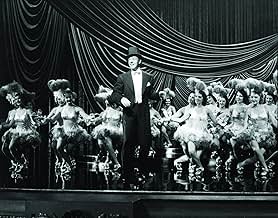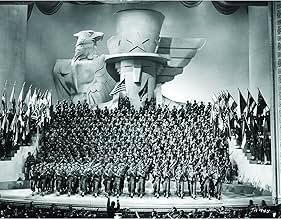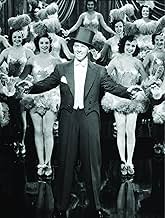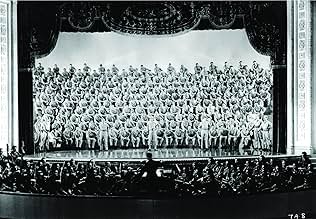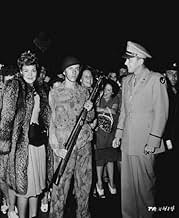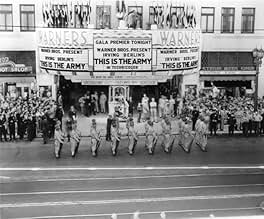VALUTAZIONE IMDb
5,8/10
1407
LA TUA VALUTAZIONE
Aggiungi una trama nella tua linguaA soldier wounded in the War (WWI) becomes a producer and stages a show for the forces.A soldier wounded in the War (WWI) becomes a producer and stages a show for the forces.A soldier wounded in the War (WWI) becomes a producer and stages a show for the forces.
- Regia
- Sceneggiatura
- Star
- Vincitore di 1 Oscar
- 3 vittorie e 2 candidature totali
Ronald Reagan
- Johnny Jones
- (as Lt. Ronald Reagan)
Alan Anderson
- Assistant Stage Manager Anderson
- (as 1st Sgt Alan Anderson)
Ezra Stone
- M
- (as M/Sgt. Ezra Stone)
- …
Recensioni in evidenza
I first saw this film on cable in the late 1970's, and was mesmerized by the story and the music. Certainly, as many people comment, it is propagandistic, but it is also a masterpiece, showcasing an almost-forgotten time. Irving Berlin is one of this country's most prolific and best-loved songwriters, and this musical extravaganza is an homage to his talent and genius.
The cast is unique and wonderful. The main characters are played solidly by "name" stars, but the musical ensemble cast (real U.S. soldiers at the time) are what set this film apart.
A reviewer complaining that it isn't "realistic" overstates the point. So what if you think an "average" army base couldn't produce a cast for a show like this. Film is a medium that attempts to suspend reality and let you enter a place, situation, relationship, time period, etc. that you might not otherwise get to experience. It's sometimes the view of one person's "reality," a manifestation of their own "vision."
My copy of this film is on a very old (early 80's) VHS copy, a low-end bargain release which is of marginal quality, but I love every minute of it. I certainly hope someone reviews some of the specific DVD choices out there, I'd like to get the DVD before I wear out the VHS!
If you enjoy a good flag-waving, patriotic musical, this is a film you will enjoy. If you enjoy Irving Berlin's music, it's a soundtrack you will enjoy. Personally I'd put this on a par with the 1942 film, "Yankee Doodle Dandy," and both films share a few cast members!
The cast is unique and wonderful. The main characters are played solidly by "name" stars, but the musical ensemble cast (real U.S. soldiers at the time) are what set this film apart.
A reviewer complaining that it isn't "realistic" overstates the point. So what if you think an "average" army base couldn't produce a cast for a show like this. Film is a medium that attempts to suspend reality and let you enter a place, situation, relationship, time period, etc. that you might not otherwise get to experience. It's sometimes the view of one person's "reality," a manifestation of their own "vision."
My copy of this film is on a very old (early 80's) VHS copy, a low-end bargain release which is of marginal quality, but I love every minute of it. I certainly hope someone reviews some of the specific DVD choices out there, I'd like to get the DVD before I wear out the VHS!
If you enjoy a good flag-waving, patriotic musical, this is a film you will enjoy. If you enjoy Irving Berlin's music, it's a soundtrack you will enjoy. Personally I'd put this on a par with the 1942 film, "Yankee Doodle Dandy," and both films share a few cast members!
First of all, had you done your research, you would've known that all three branches of the military had (and still have) entertainment divisions whose sole job is to produce shows for the troops. If you looked at the "Crazy Credits" section you would've learned that famed composer Irving Berlin staged the two soldier shows as depicted in the movie.
Yes, many of the skits and songs are terribly dated and yes "This is the Army" is largely a propaganda film, but Berlin singing his "Oh How I Hate to Get Up in the Morning" was the lament of every draftee.
Virtually *every* film made during WWII was done either as propaganda or to bolster the spirits on the homefront.
I respectfully suggest watching it again, but instead of looking at it with 2004 cynicism, look at it in the context of the times.
Yes, many of the skits and songs are terribly dated and yes "This is the Army" is largely a propaganda film, but Berlin singing his "Oh How I Hate to Get Up in the Morning" was the lament of every draftee.
Virtually *every* film made during WWII was done either as propaganda or to bolster the spirits on the homefront.
I respectfully suggest watching it again, but instead of looking at it with 2004 cynicism, look at it in the context of the times.
This movie was produced as a fund-raiser and as a morale booster. At the time it was filmed we were on the verge of losing the war and the public needed a patriotic lift. The songs are not, perhaps, the best Irving Berlin ever wrote, but they speak of the era in which they were written. For those who are politically-correct, I agree that African-Americans are not shown in the best light, but, right or wrong, that was the attitude then. The minstrel show was still a popular entertainment and the idea of white actors in black-face was considered simply show business. This show was actually staffed by real, honest-to-goodness soldiers with a few actors tossed in for the starring roles. Even if you dislike the movie, appreciate it for the look it gives into American life during the 40s. I, for one, enjoy it a lot and have watched it a half-dozen times. By the way, the sound on the VHS tape is better than on several of the DVD versions that are available.
As a twenty-year resident of Yaphank, New York, which is on Long Island about 60 miles east of Manhattan, I've learned some of the background of this movie.
Irving Berlin wrote "Yip, Yip, Yaphank" while stationed at Camp Upton in Yaphank during WW I. (Camp Upton is now the Brookhaven National Laboratory.) For this show, which was indeed written to be performed by the soldiers, Berlin wrote "Oh, How I Hate to Get Up in the Morning" and the melody of "God Bless America," which was actually cut from the show in its original form.
The show even ran briefly on Broadway in 1918 with a Camp Upton cast, according to the Internet Broadway Data Base.
After the war ended, the songs were put away, then brought out for the morale-boosting efforts of WW II. Berlin frequently rewrote and reused his songs; he revised the lyrics of "God Bless America" for Kate Smith and the rest, as they say, is history.
Irving Berlin wrote "Yip, Yip, Yaphank" while stationed at Camp Upton in Yaphank during WW I. (Camp Upton is now the Brookhaven National Laboratory.) For this show, which was indeed written to be performed by the soldiers, Berlin wrote "Oh, How I Hate to Get Up in the Morning" and the melody of "God Bless America," which was actually cut from the show in its original form.
The show even ran briefly on Broadway in 1918 with a Camp Upton cast, according to the Internet Broadway Data Base.
After the war ended, the songs were put away, then brought out for the morale-boosting efforts of WW II. Berlin frequently rewrote and reused his songs; he revised the lyrics of "God Bless America" for Kate Smith and the rest, as they say, is history.
This movie is a classic of World War II movies. It was made as a moral booster during the war, and includes the music of Irving Berlin. One thing to note especially is the song "Someday I'm going to murder the bugler" which is sung by Irving Berlin himself (wearing his own WWI uniform).
In order to really appreciate this movie you need to understand the world in which it was made, which was a whole lot different than 2004. There was a world war and everyone was concerned about stopping evil. (as opposed to today, where everyone is concerned about how terrorism, or the fight against it, is going to disrupt their daily life)
This movie was made as a way to give people something to feel good about, and show patriotism.
In order to really appreciate this movie you need to understand the world in which it was made, which was a whole lot different than 2004. There was a world war and everyone was concerned about stopping evil. (as opposed to today, where everyone is concerned about how terrorism, or the fight against it, is going to disrupt their daily life)
This movie was made as a way to give people something to feel good about, and show patriotism.
Lo sapevi?
- QuizThe #1 moneymaker of 1943.
- BlooperThe uniform worn by Gertrude Niesen in the opening sequence is strictly of a 1943, not 1917, design, complete with padded shoulders and knee length skirt, and totally inappropriate to the 1917 era.
- Citazioni
Irving Berlin: [singing] I've been a soldier quite awhile and I would like to state, the life is simply wonderful, the Army food is great. I sleep with 97 others in a wooden hut, I love them all, they all love me, It's very lovely, but - Oh, how I hate to get up in the morning...
- Curiosità sui creditiIn the Credits, the cast members are listed in the following order: first the members, who never served in World War II, than the members of the US Armed Forces, starting with Lt. Ronald Reagan.
- Versioni alternativeOriginally shown with a pre-credits overture and exit music after the film ends, both of which have been restored on the official DVD release.
- ConnessioniFeatured in Show-Business at War (1943)
I più visti
Accedi per valutare e creare un elenco di titoli salvati per ottenere consigli personalizzati
- How long is This Is the Army?Powered by Alexa
Dettagli
- Data di uscita
- Paese di origine
- Lingua
- Celebre anche come
- Irving Berlin's This Is the Army
- Luoghi delle riprese
- Azienda produttrice
- Vedi altri crediti dell’azienda su IMDbPro
Botteghino
- Lordo Stati Uniti e Canada
- 20.831.178 USD
- Tempo di esecuzione2 ore 1 minuto
- Proporzioni
- 1.37 : 1
Contribuisci a questa pagina
Suggerisci una modifica o aggiungi i contenuti mancanti



